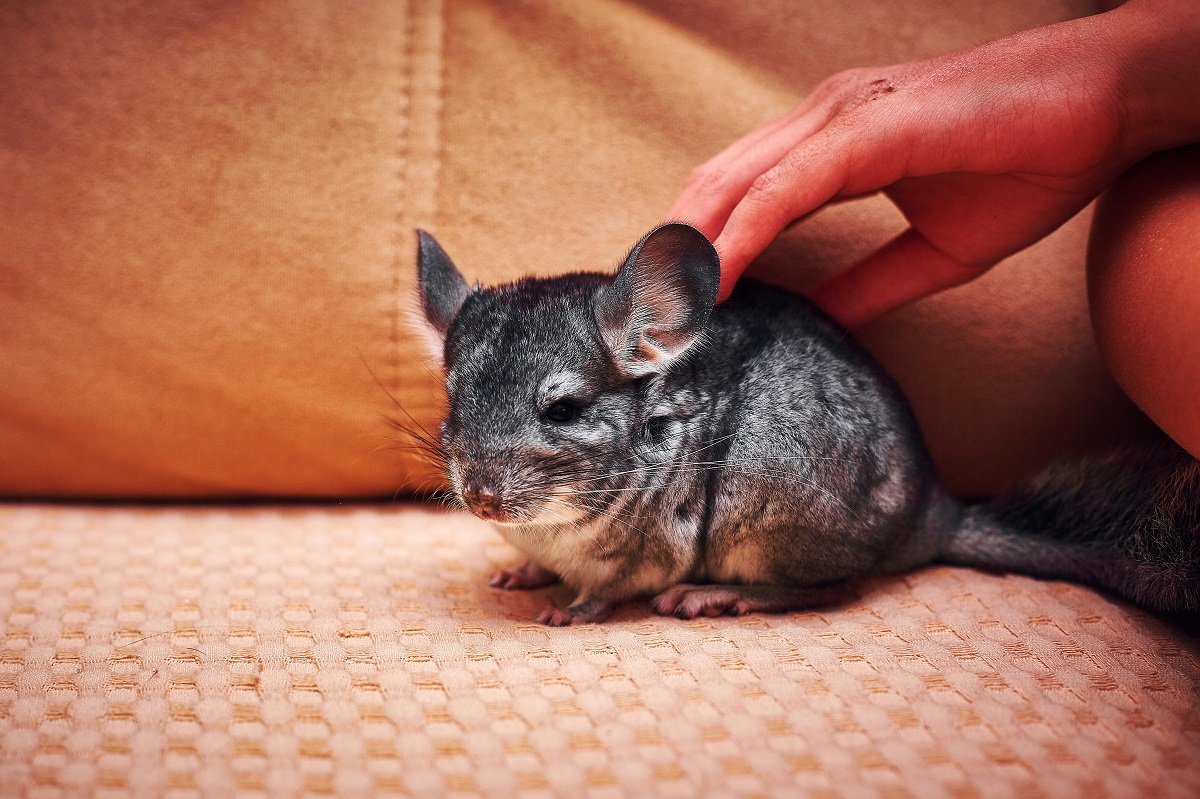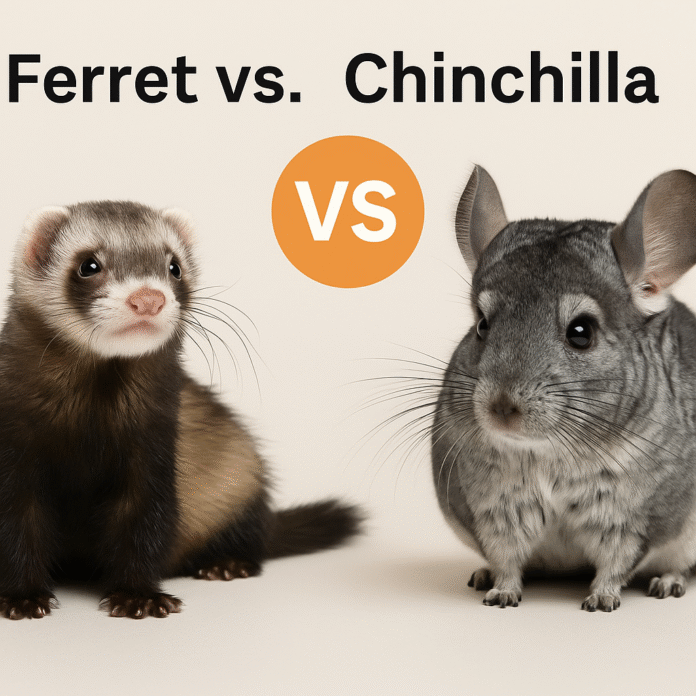Summary: Ferrets and chinchillas are both affectionate, small exotic pets, but they differ significantly in behavior, habitat, and care needs. Ferrets are playful, social carnivores that love interaction, require secure, climbing-friendly enclosures, and enjoy varied diets including meat-based foods. Chinchillas are shy, crepuscular rodents with ultra-soft, dense fur; they're dust-bathing herbivores that need cooler temperatures and spacious cages. While ferrets thrive on handling and active play, chinchillas prefer a calmer environment with opportunities for jumping, chewing, and social enrichment.
Regarding unconventional pets, ferrets vs chinchillas stand out for their intelligence, charm, and larger-than-life personalities. While both can make wonderful companions, they have vastly different care needs, temperaments, and lifestyles. If you’re trying to decide between these two fascinating animals, this in-depth guide will help you understand which one aligns best with your home, schedule, and personality.
Ferrets: The Playful, Mischievous Clowns

Why Choose a Ferret?
Ferrets are often described as a cross between a cat and a dog—playful, curious, and energetic. They thrive on interaction and can form deep bonds with their owners.
Pros of Owning a Ferret
Highly Social & Affectionate – Ferrets love being around people and other ferrets. They enjoy cuddling (when they finally tire out) and often seek attention.
Entertaining & Energetic – Their playful antics, including the famous “weasel war dance” (a series of hops and sideways jumps), make them endlessly amusing.
Intelligent & Trainable – They can learn tricks, respond to their names, and even be litter-trained (though some accidents are inevitable).
Interactive & Dog-Like – Ferrets enjoy games like chasing toys, tunneling through blankets, and even playing fetch.
Cons of Owning a Ferret
Require Constant Supervision – Ferrets are escape artists and will explore every nook and cranny, often getting into dangerous situations if left unattended.
Strong Natural Odor – Even descended ferrets have a musky smell, and their bedding needs frequent cleaning to minimize the scent.
High Energy & Demanding – They need at least 3–4 hours of free-roaming playtime daily to stay happy and healthy.
Prone to Health Issues – Common problems include adrenal disease, insulinoma, and intestinal blockages (from chewing inappropriate objects).
Short Lifespan – Typically 5–9 years, which is shorter than many other small pets.
Best For
Owners who want an interactive, high-energy pet.
People who don’t mind frequent cleaning and supervision.
Households without very young children (ferrets can nip if startled).
Chinchillas: The Gentle, Soft-Furred Acrobats

Why Choose a Chinchilla?
Chinchillas are delicate, soft, and surprisingly long-lived. They’re more independent than ferrets but can still form bonds with patient owners.
Pros of Owning a Chinchilla
Incredibly Soft Fur – Their fur is the densest of any land mammal, making them irresistibly fluffy.
Long Lifespan – With proper care, they can live 10–20 years, making them a long-term commitment.
Quiet & Clean – Unlike ferrets, chinchillas produce little to no odor, and their droppings are dry and easy to clean.
Low-Maintenance Grooming – Instead of water baths, they take dust baths (a fun spectacle to watch!).
Gentle & Curious – While not as hyper as ferrets, they enjoy climbing and exploring in a safe space.
Cons of Owning a Chinchilla:
Fragile & Easily Stressed – Loud noises or improper handling can frighten them, and their bones are delicate.
Nocturnal Habits – They’re most active at dawn and dusk, which may not align with your schedule.
Destructive Chewers – They need a safe, wire-free environment because they will gnaw on everything.
Not Naturally Cuddly – Most chinchillas prefer climbing and hopping over being held for long periods.
Temperature Sensitive – They overheat easily and need a cool environment (ideally below 75°F/24°C).
Best For
Owners who prefer a quieter, low-odor pet.
People are willing to provide a large, multi-level cage for climbing.
Those who enjoy observing rather than constant hands-on interaction.
Final Decision Ferret or Chinchilla?
Choose a Ferret If You
Want a playful, social pet that acts like a mix between a cat and a dog.
Don’t mind daily playtime and supervision.
Can handle some odor and frequent cage cleaning.
Prefer a pet that actively engages with you.
Choose a Chinchilla If You
Want a long-lived, low-odor pet.
Prefer a quieter, more independent animal.
Can provide a cool, spacious cage with climbing opportunities.
Enjoy watching acrobatic antics rather than constant cuddling.
Conclusion
Both ferrets and chinchillas are rewarding but demanding pets in their own ways. Ferrets are high-energy, interactive clowns, while chinchillas are gentle, elegant, and long-lived. Your choice depends on whether you want a hands-on, playful companion (ferret) or a calmer, observational pet (chinchilla).
Frequently Asked Questions
What are the main differences between ferrets and chinchillas?
Ferrets are social carnivores needing interactive play and climbing space; chinchillas are shy, herbivorous rodents that require cooler temperatures and dust baths.
Which pet is better for first-time owners?
Chinchillas are generally easier for beginners due to low handling needs, while ferrets require more supervision and interaction.
What do ferrets eat?
Ferrets need high-protein, meat-based diets—commercial ferret foods, raw, or cooked meats.
What do chinchillas eat?
Chinchillas eat hay (like timothy), chinchilla pellets, and occasional treats; they should not have sugary or fatty foods.
How much space do they need?
Ferrets need multi-level cages with tunnels and toys, while chinchillas need tall cages with shelves and hiding spaces for jumping.
Are ferrets noisy or smelly?
Ferrets can be smelly if not neutered and require regular cage cleaning, but they are typically quiet pets.
Do chinchillas require special housing?
Yes, chinchillas require dust baths, cool environments (around 18 °C), and chew-safe cage materials.
Can ferrets and chinchillas live together?
No—due to different dietary needs and behaviors, they should never be housed together.
How long do they live?
Ferrets live about 6–10 years; chinchillas typically live 10–20 years with proper care.
Which pet is more interactive?
Ferrets are very interactive and playful with their owners, while chinchillas are calmer and prefer minimal handling.
Do chinchillas bite?
Chinchillas can bite when scared or mishandled, but they are generally gentle and prefer to avoid handling.

